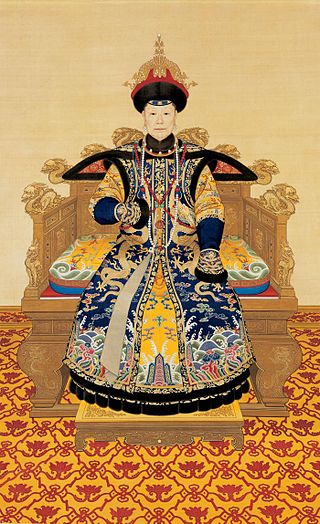Related Research Articles

Empress Xiaoshengxian, of the Manchu Bordered Yellow Banner Niohuru clan, was a posthumous name bestowed to the consort of Yinzhen, the Yongzheng Emperor and mother of Hongli, the Qianlong Emperor. She was honoured as Empress Dowager Chongqing during the reign of her son and posthumously honoured as empress, although she never held the rank of empress consort during her lifetime.
Ah Toy (Chinese: 亞彩; Sidney Lau: Aa3 Coi2; 18 May 1829 – 1 February 1928) was a Chinese American sex worker and madam in San Francisco, California during the California Gold Rush, and the first Chinese sex worker in San Francisco. Arriving from Hong Kong in 1848, she became the best-known Asian woman in the American frontier.
Liu Qingyun, courtesy name Guxiang, was a Chinese playwright and poet. She has been described as "the most prolific woman playwright of the nineteenth century".

Ming poetry refers to the poetry of or typical of the Ming dynasty (1368–1644). With over one million specimens of Ming poetry surviving today, the poetry of the Ming dynasty represents one of the major periods of Classical Chinese poetry, as well as an area of active modern academic research. Ming poetry is marked by 2 transitional phases, the transition between the Yuan dynasty which was the predecessor to the Ming, and the Qing-Ming transition which eventually resulted in the succeeding Qing dynasty. Although in politico-dynastic terms, the dynastic leadership of China is historically relatively clear-cut, the poetic periods involved encompass the lifespans and works of poets whose lives and poetic output transcend both the end of one dynasty and the initiatory period of the next.

Fang Shengdong was a late Qing dynasty revolutionary, He was killed during the Second Guangzhou Uprising.
Fang Weiyi, was a Chinese poet, calligrapher, painter and literature historian.
Kong Sizhen, was a Chinese military commander and princess.
Hong Xuanjiao, also known as Yang Yunjiao and Yang Xuanjiao, was a Chinese general and rebel leader during the Taiping Rebellion. She was said to be the younger sister of the leader of Taiping Heavenly Kingdom, Hong Xiuquan, and is the wife of Xiao Chaogui, the West King. She led women into the battlefield against the Qing dynasty for the Taiping cause.
Hu Jiumei (1830–1856) was a Chinese rebel during the Taiping Rebellion. A leading follower of Hong Xiuquan, she was known as one of the "Three Hu's".
Cai Wan (1695-1755), was a Chinese poet.
Cao Zhenxiu was a Chinese author, poet, calligrapher, and painter.
Fang Wanyi (1732-1779), was a Chinese poet and painter. She married the painter Luo Ping in 1752, and painted several works both with him as well as alone. Many of these works were exhibited in Beijing during her lifetime, and became well-known.
Gu Mei, better known by her art name Gu Hengbo, also known as Xu Shanchi(徐善持) and Xu Zhizhu(徐智珠) after her marriage, was a Chinese Gējì, poet and painter. She received the title "Lady (furen)" from the early Qing court, and often addressed as "Lady Hengbo" in Qing writings.
Cai Han, was a Chinese landscape painter. She was the concubine of the painter Mao Xiang and, with his other concubine Jin Yue, she was commissioned by him with the task of producing paintings as gifts to his guests; they became known as "The Two Painters of the Mao Family".
Ding Yu, was a Chinese painter. She was married to the painter Zhang Pengnian (1761–1818) and was known for her portrait paintings in the Western style.

Yun Zhu or Wanglan Yun Zhu aka Adept of the Lotus Lake was a Qing dynasty poet, painter, anthologist and moralist. She gathered together thousands of poems written by hundreds of women.
Events from the year 1872 in China.
Lin Yining, courtesy name Yaqing, was a Chinese poet active during the Qing dynasty. A founding member of the Banana Garden Poetry Club, Lin Yining was also an avid painter and composer.

The Eight Beauties of Qinhuai, also called the Eight Beauties of Jinling, were eight famous Yiji or Geji during the Ming-Qing transition period who resided along the Qinhuai River in Nankin. As well as possessing great beauty, they were all skilled in literature, poetry, fine arts, dancing and music.
References
- Lily Xiao Hong Lee; Clara Lau; A.D. Stefanowska (17 July 2015). Biographical Dictionary of Chinese Women: v. 1: The Qing Period, 1644-1911. Taylor & Francis. ISBN 978-1-317-47587-3.
- ↑ Sanders, Graham (2017-01-04), Szonyi, Michael (ed.), "History of Premodern Chinese Literature", A Companion to Chinese History (1 ed.), Wiley, pp. 221–234, doi:10.1002/9781118624593.ch18, ISBN 978-1-118-62460-9 , retrieved 2024-02-08
- ↑ Lily Xiao Hong Lee; Clara Lau; A.D. Stefanowska (17 July 2015). Biographical Dictionary of Chinese Women: v. 1: The Qing Period, 1644-1911. Taylor & Francis. ISBN 978-1-317-47587-3.
- ↑ BERG, DARIA (2007), "Negotiating gentility: The Banana Garden poetry club in seventeenth-century China", The Quest for Gentility in China, Routledge, doi:10.4324/9780203938232-13/negotiating-gentility-banana-garden-poetry-club-seventeenth-century-china-daria-berg, ISBN 978-0-203-93823-2 , retrieved 2024-02-08
- ↑ Idema, Wilt; Grant, Beata (2004-12-08), "The Banana Garden Poetry Club", The Red Brush, Harvard University Asia Center, pp. 471–495, ISBN 978-1-68417-394-5 , retrieved 2024-02-08
- ↑ Robertson, Maureen (1997-04-01), "7 Changing the Subject: Gender and Self-inscription in Authors' Prefaces and "Shi" Poetry", 7 Changing the Subject: Gender and Self-inscription in Authors' Prefaces and "Shi" Poetry, Stanford University Press, pp. 171–218, doi:10.1515/9780804765916-010/pdf?licensetype=restricted, ISBN 978-0-8047-6591-6 , retrieved 2024-02-08